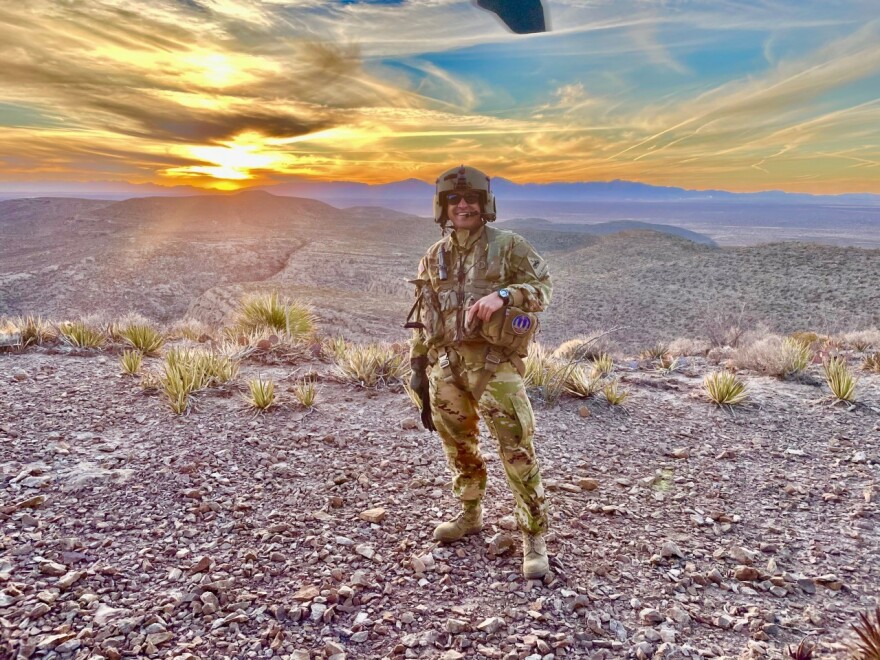On a recent Monday evening, a book club met to discuss the Greek play Agamemnon. It’s a tragedy, about a king coming home after a long, brutal war. When King Agamemnon first shows up in his home city, a group of wise, old men don't know how to greet him. They ask, “How shall I hail you, how give honor?”
“When I read that, it kind of reminded me of when I came back from Afghanistan,” Anant Shukla told the group, over Zoom. “Not so much about like, how do I hail you? But how do I even approach you?”
Shukla lives in Lebanon, New Hampshire where he’s an emergency medicine resident at Dartmouth-Hitchcock Medical Center. He was late to the meeting, after coming home from the hospital.
He’s also an active-duty military physician and part of a virtual book club made up of several generations of veterans in the Upper Valley. They were reading a play written more than 2,000 years ago by the Greek author Aeschylus, who was a soldier himself. He fought in the Persian Wars, around the year 490 BCE.

Shukla says this awkwardness of coming home from war ― how people don’t really know what to say ― he felt it when he first saw his parents after getting back from Afghanistan in 2019.
“I walked up to hug my mother. And the first thing she did is she held my hand, and looked at it, because it was tan and callous,” he said.
The memory of his first interaction after returning from war sticks out for Fred Crowley too. He’s a retired physician in Norwich, and he was a flight surgeon in Vietnam. He spoke up after Shukla.
“When I came back, both my wife and my mother were waiting there," he said. "And within the first 10 minutes, they both remarked on how much I had changed."
That came as a surprise to Crowley. “It really struck me when they said, ‘Yeah, Fred, you changed,’” he said. “How, how? I didn't know.”
“It allows me to see that warfare ― the visceral and the important aspects, the developmental aspects, of what war can do to a person ― hasn't changed since antiquity."Anant Shukla, veterans' book club participant
Reading about the challenges of war presented in literature ― and having the chance to talk through them with other combat veterans ― has made these Monday night meetings feel sacred for many who attend.
“It allows me to see that warfare ― the visceral and the important aspects, the developmental aspects, of what war can do to a person ― hasn't changed since antiquity,” Shukla said.
The group broaches subjects like PTSD and suicide that some veterans might otherwise not have the space to discuss.
“These topics that you don't talk about when you're checking out your groceries,” Kate Van Arman, of Thetford, told me. “That you don't talk about when you're picking your kid up from the bus stop with the other mothers, that kind of thing.”
Van Arman grew up on a farm in Norwich and served as a nurse in the Army for 20 years. She said coming back to Vermont was an adjustment, and the book group was there for her.
These conversations are possible because of the person moderating these groups, Roberta Stewart. She’s a classics professor at Dartmouth College, which also supports the group.
“I had an idea about 12 years ago that I wanted to read world literatures of war with veterans,” Stewart said. Since then, she’s been reading war stories with veterans in the Upper Valley, and elsewhere. She said the book groups provide a unique framework for veterans to discuss the experience of war.
“If the goal is the discussion of the text, if I don’t want to talk about something, I don’t have to,” she said. “You might understand Agamemnon viscerally because of your own personal experience, but you don’t have to talk about yourself, unless you want to.”

Usually those conversations take place around a table at the public library in Hanover, with cookies and coffee. But during the pandemic that was put on hold. For a while, they stopped meeting altogether. Then, almost a year ago, the Defense Department announced troop withdrawals in Iraq and Afghanistan.
At the time, a former Marine captain published an op-ed in the New York Times that said, “We lost.” It came out months before the Taliban overtook Afghanistan.
“Personally, it triggered a lot of questions,” said Zac Conaway, of Groton, another member of the book group and Afghanistan veteran, who’s helped organize the meetings in recent years.
After the article came out, he said the group started up again over Zoom. They picked out stories that might help them make sense of this moment, from All Quiet on the Western Front and The Road Back about German soldiers in World War I, to The Sorrow of War, by a Vietnamese writer and former soldier.
For Conaway, asking questions of Vietnam veterans has helped him process his own feelings about Afghanistan.
“Like, ‘Is this how it felt for you when Saigon fell,’’ he said. “And trying to correlate that dichotomy with what they've gone through.”
For now, the group is back to the classics. They’ve finished Agamemnon, and are onto the next Aeschylus play, about a trip to a tomb. It’s brought up questions about memorials, and what you say to someone you’ve loved and lost.
There’s no shortage of classical literature on war, so the book group could keep going for a very long time.
Lexi Krupp is a corps member for Report for America, a nonprofit national service program that places journalists in local newsrooms to report on under-covered issues and regions.
Have questions, comments or tips? Send us a message or get in touch with reporter Lexi Krupp @KruppLexi.




